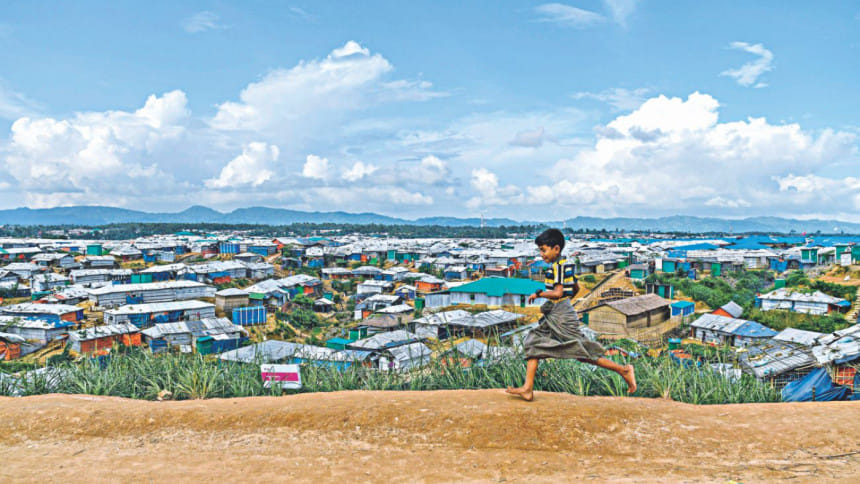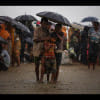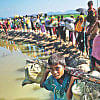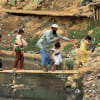Myanmar calls it 'meritless'

Myanmar has categorically rejected the International Criminal Court (ICC) prosecutor's request to seek jurisdiction over suspected deportations of Rohingyas from Myanmar to Bangladesh, saying it was meritless.
“The request by the prosecutor [of ICC] may be interpreted as an indirect attempt to acquire jurisdiction over Myanmar, which is not a state party to the Rome Statute,” said a statement of Myanmar's office of the state counsellor yesterday.
Myanmar has declined to engage with the ICC by way of a formal reply.
Early April, Fatou Bensouda, chief prosecutor for the ICC in The Hague, had asked judges to rule whether the body has jurisdiction to open a probe into the deportation of the Rohingyas across the international border into Bangladesh.
The Court then asked Myanmar to come up with opinion. The prosecutor had also asked for opinion from Bangladesh, which has already responded to the queries of ICC over its jurisdiction to run a case against Myanmar in regard to the Rohingya issue.
Over 720,000 Rohingyas fled a brutal military campaign since late August last year. Doctors without Borders said in a month since the violence began, some 6,700 from the minority group were killed.
Myanmar, which has been denying Rohingya citizenship, government jobs, healthcare, higher education, freedom of movement, said its action was a response to the attacks by Arakan Rohingya Salvation Army (ARSA).
Rights bodies and many other countries demanded that the UN Security Council refers Myanmar's situation to the ICC. The UN has not done so or taken any concrete action against Myanmar to address the Rohingya crisis mainly because of opposition from China and Russia, the veto powers.
Against this backdrop, the ICC sought opinions of both the countries. The main reason for doubts about the jurisdiction is that Bangladesh is a member of the ICC, but Myanmar is not.
ICC prosecutor Fatou Bensouda argued that given the cross-border nature of the crime of deportation, a ruling in favour of ICC jurisdiction would be in line with established legal principles.
However, Myanmar said, “As it is, the sources on which the prosecutor has relied for the purpose of the request present a completely one-sided and biased narrative of the events in Rakhine.”
The statement said Myanmar is under no obligation to enter the litigation with the prosecutor.
It added Myanmar has formed an independent commission of enquiry to investigate the alleged human rights violations and related issues.
Rights bodies, however, were critical of Myanmar's domestic investigation.
BANGLADESH DELEGATION IN NAYPYIDAW
Meanwhile, a 15-member Bangladesh delegation led by Foreign Minister AH Mahmood Ali reached Naypyidaw for talks with Myanmar and visit to Northern Rakhine State to see preparations made for the return of Rohingyas, reports our diplomatic correspondent.
Dhaka hopes the visit will help expedite the repatriation. However, officials said the latest UN report apparently frustrates Bangladesh as Myanmar has not yet granted UN staff independent and effective access to Rakhine even after signing a deal two months ago.
This is for the first time Myanmar agreed to take the Bangladesh delegation for a tour to Rakhine since the military crackdown late August last year.
Foreign ministry officials said the Bangladesh delegation during its four-day visit, will hold meeting this morning with three important government leaders -- Vice President Myint Swe, Minister of the State Counsellor Kyaw Tint Swe and Minister of Social Welfare, Relief and Resettlement Dr Win Myat Aye.
The delegation is yet to get any appointment to meet Myanmar State Counsellor Aung San Suu Kyi.
Foreign ministry officials said the Bangladesh delegation will reiterate its call to implement the recommendations of the Advisory Commission on Rakhine State, “including a clear, voluntary and equal pathway to citizenship for all eligible individuals”.
Myanmar's Ambassador to Bangladesh, Lwin Oo, told The Daily Star the visit by Bangladesh delegation will give an impetus to the bilateral efforts for the implementation of the repatriation.

 For all latest news, follow The Daily Star's Google News channel.
For all latest news, follow The Daily Star's Google News channel. 








Comments